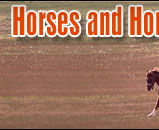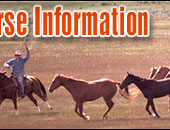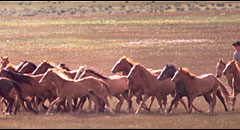 |
   |
|
|
|
You are here: Horses > Horse pasture / forage > Fescue's threat |
Understanding the Problems with Fescue
While in the past fescue was the pasture grass of choice, since the 1970s fescue
has become known more as a threat to the health of the animals. The culprit is a
fungus – known as an endophyte – that has been found to harm cattle, and while
for the longest time there was no proof that it harmed horses, it has now been
shown to cause serious health issues in the equine communities.
|
|
|
What made fescue so popular in the past is simply its
hardiness which makes it germinate quickly, grow
undauntedly, and survive prolonged grazing as well as
droughts and frost. Last but not least, horses love the
taste of fescue!
Unfortunately, many of the popular fescue varieties – such
as the KY 31 – are riddled with the endophyte fungus which
has been linked to severe problems in brood mares, such as
abortion and extended gestation periods, difficulty during
foaling, decreased lactation, and also the death of the
mares. As a matter of fact, foaling was
|
the time most noted when the fungus’ detrimental effects would
show themselves.
Many breeders have reported that even if their foals are
born alive, and the placenta has not prematurely separated,
or any other birth problems have been avoided, the decreased
lactation of the mares has resulted in a reduced immunity
that is passed to the foal via the colostrum the mare would
normally produce in sufficient quantities, thus requiring
breeders to supplement antibodies via infusion. The problems
do not end there, either. As the foals begin to graze the
affected fescue itself, their growth may well be stunted –
this condition, however, can be reversed by feeding
sufficient grain on a daily basis.
Fortunately, the threat of the endophyte is now being
understood, and as such it has shown to interfere severely
with hormones, specifically progesterone and also prolactin.
Obviously, concerned horse owners understand that the more
infected fescue their horses ingest, the higher the
probability of problems. Unfortunately, it is hard to tell
if the fescue on your pasture is infected or not. Since the
mold grows on the inside of the plant instead of the
outside, the naked eye will not be able to ascertain if an
infection is present. In order to find out if your fescue is
infested, the seeds and roots of plant samples need to be
tested in a laboratory. The good news is the fact that it
does not affect the soil of your pasture itself or other
plants.
If your fescue proves to be infected, you may choose to kill
off the fescue in your pasture and reseed with a different
kind of grass or fungus free fescue after waiting for a
season. Obviously, this is expensive and also time
consuming. Other horse owners have decided to remove
pregnant mares from pastures with infected fescue at least
90 days prior to foaling. If this is not a viable option,
there are hormone stimulating drugs manufactured for mares
which can counter the fungus’ effects on them. Your
veterinarian will be able to ascertain if your mares are
good candidates for this treatment. A third option involves
over-seeding with clover which grows well in fescue and
which is eaten up eagerly by horses that will then not be as
hungry for the fescue.
 |
Read the next horse pasture article on Grazing and Poisionous Plants. |
|
|
|
|
 |
|
|
|
|
|
Horse Education
|
|
|
|
|
Horse Information Topics
|
|
|
|
|
|
|
|
Horse Business Owners
|
| |
Advertise with Us
Have your horse products or services exposed to over 27,000 of our monthly visitors.
|
|
|
|
|
|